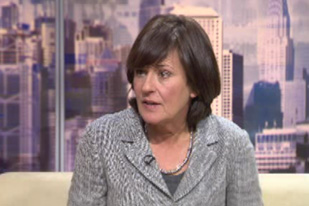
Shawn Slovo
The daughter of prominent anti-apartheid campaigners talks about her new film.
 |
| Shawn Slovo talks about her parents and her new film |
Sir David Frost: If anyone has a claim to be one of white South Africa’s first families it surely is the Slovo’s. Joe Slovo was head of the Communist party, an ANC leader and then housing minister in Nelson Mandela’s cabinet. His wife, Ruth Hurst, was a prominent anti-apartheid campaigner murdered in 1982 by a parcel bomb sent by the South African security services.
Now their daughter Shawn has collaborated with one of her sisters, Robin, to make a film, Catch a Fire, in which their parents feature as incidental characters. Shawn wrote the script and Robin both produced it and appears briefly as her own mother.
Keep reading
list of 4 items‘Nothing left’: How climate change pushes Indigenous people from their land
‘Refuge of the last dreamers’: Luang Prabang, a city suspended in time
Canadian Nobel-winning author Alice Munro dies aged 92
What is your first and best memory of your father?
Shawn Slovo: I have a lot of great memories of my father. For the first ten years of our life we led a very normal white middle class life in South Africa. The thing that was most communicated to me was his love of life in all kinds of ways. So even though he had this intense political activity and this total commitment to the liberation of South Africa, he was a funny man who loved his guitar, loved to sing. We had great holidays. So the accumulation of those memories are what I carry with me about him.
DF: Of course, 27 years in exile, the same length of time Nelson Mandela was in Robben Island and the other prison. How did you find out, do you know who murdered your mother?
SS: She was assassinated in 1982 by a parcel bomb that was sent by the South African authorities. In the 1990’s during Desmond Tutu’s Truth and Reconciliation Commission, Craig Williamson and others appeared before the TRC to confess to the crime and to ask for amnesty. So yes we know who the men are who were responsible.
DF: And you were close to them [at the TRC]?
SS: As close as I am to you.
DF: What made you decide to write this particular film?
SS:
 |
| Catch a Fire |
You know it is never a writer’s decision to make a film. Films are so incredibly expensive and the film business is so competitive that it has to be others who will agree with you that this is a good story to be made into a film.
What attracted me to the story is that it was told to me by Joe in the 80’s just after the events depicted in the film. Like all screenwriters you are looking for a great story and I figured Joe has access to great stories and what he said is you should tell the story of an ordinary working man, a family man – Patrick Chamuso. Don’t tell the story of one of the icons of the South African liberation struggle – Mandela or Mbeki or Oliver Tambo or Walter Sisulu – but an ordinary working man. And I think these are the men that Joe identified with. These are the South African people whose struggle he was involved with.
DF: I read that in South Africa the film has been censored in that under 16’s are not allowed to see it.
SS: I don’t understand that. I think it must be a left over from the early apartheid censorship laws. The problem with releasing this film in South Africa is those who are interested in seeing this story, who are the majority of the South African people – black South Africans – don’t yet have access to the movie theatres. So we weren’t able to show the film to the audience who are most engaged by this story. Because building movie theatres and malls is a low priority given the problems in South Africa today and the allocation of resources so most black South Africans still don’t have access to the malls and don’t have cinemas in the areas in which they live.
To contact us click on ‘Send your feedback’ at the top of the page